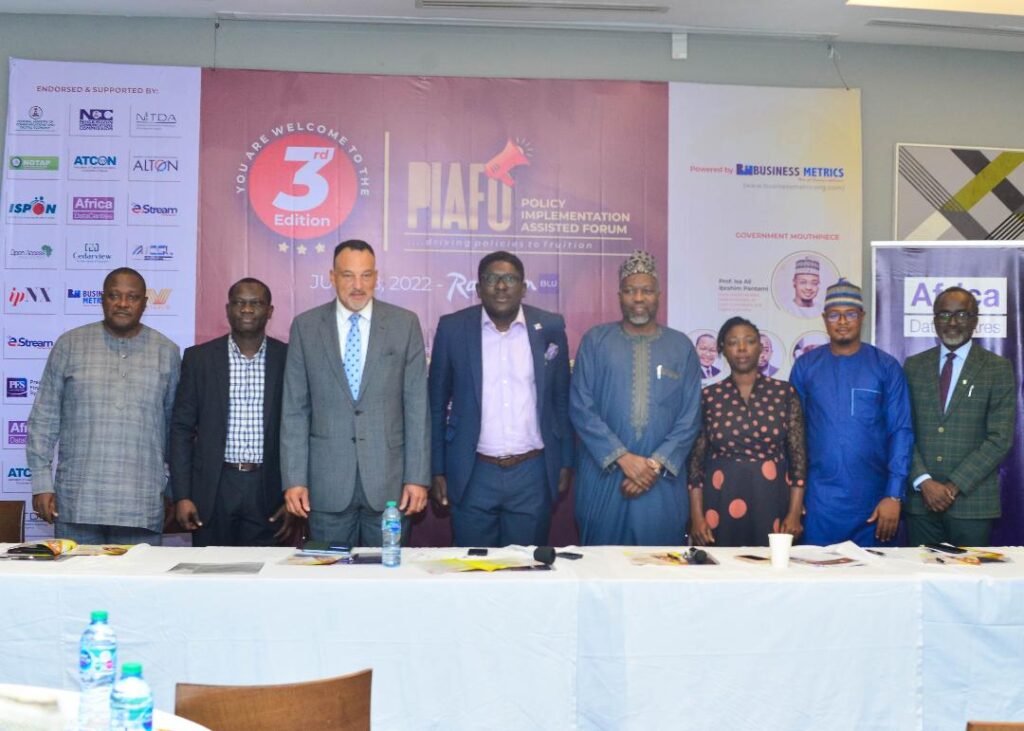The Executive Vice Chairman of the Nigerian Communications Commission, Professor Umar Danbatta, has said the commission has so far identified 72 action points to promote indigenous content in the telecoms sector.
Danbatta disclosed this in his keynote address at the third edition of the Policy Implementation Assisted Forum with the theme: ‘Establishing Trackable Metrics for Developing Nigeria’s Indigenous Telecoms Sector’ in Lagos on Thursday.
He added that the commission has also brought at least 30 stakeholders to the round table to chart a way for the effective implementation of the National Policy for Promotion of Indigenous Content Policy in the Nigerian Telecommunications Sector (NPPIC) assented to By President Muhammadu Buhari in May 2021.
Represented by Babagana Digima, Head, of the Nigeria Office for Promoting the Indigenous Telecoms Sector (NODITS), the EVC stressed that different entities include Ministries, Departments and Agencies (MDAs), Mobile Network Operators (MNOs), SIM card manufacturers, tower and mast manufacturers, and Original Equipment Manufacturers (OEMs).

He said: “At a higher level, the Commission had identified some time-based metrics for NPPIC which it classed into immediate, short term, medium term, and long-term items these include activities such as the creation of NODITS dedicated to guiding the policy; constitution of the local content steering committee; engagement with relevant internal and external stakeholders; and commissioning baseline studies on the level of indigenous content in the Nigerian telecoms industry.”
Others, according to him, include the development of regulations, monitoring and enforcement of Key Performance Indices (KPIs) and methodologies; development of implementation guidelines; and continuous efforts in research and development (R&D); and monitoring, evaluation and enforcement.
The NCC boss noted the NPPIC requires more focused and direct actions than undertaken before now.
“To ensure the effective implementation of the NPPIC, we have articulated several targets and high-impact interventions, which are Specific, Measurable, Attainable, Relevant and Time-based (SMART).
“We will therefore be counting on the efforts of industry stakeholders, watchdogs and partners such as Business Metrics to create independent metrics that will ensure the achievements of the goals of the NPPIC,” Danbatta said.
He further noted that some of the 72 action points and plans are already being implemented by the Commission through NODITS which in some instances have also yielded fruits.
“An example is capturing some of the target areas for gazette by the Federal Government and Companies providing such goods and services shall be accorded pioneer industry status by the Nigerian Investment Promotion Commission.
“Another achievement is the consideration given to telecommunications services as an exportable non-tangible asset by the Nigerian Export Promotion Council (NEPC), thereby enjoying promotion and funding,” he said.
According to him, the Commission was also fully involved in the successes achieved thus far “as we are also promoting the establishment of a manufacturing facility for Corrugated Optical Duct (COD) in Nigeria which will complement the recent launch of the first optic fibre cable (OFC) manufacturing plant by Coleman Technical Industries in conjunction with Corning, a world-renowned leader in OFC development and manufacturing.”
He said the provision of skilled manpower, funding and software development is equally receiving attention, noting however that this will require a different set of metrics such as skill areas, available personnel, skill migration, and new skill development for which the industry will be a key driver and source of statistics.
“Our discussions with the Digital Bridge Institute (DBI) and some of the MNOs, TowerCos and OEMs is centered around skills development as well as repair and maintenance of telecoms equipment both of which are a key elements for the indigenous emancipation of the telecoms industry, the EVC said.
In his remarks, Omobayo Azeez, Convener of PIAFo, stressed that the need to domesticate inputs into the telecoms sector to ease pressure on the Nigerian economy.
While acknowledging that the telecommunications sector had unarguably become one indispensable economic enabler for the country and its people, he said sadly, the sector remains grossly dependent on foreign inputs which at the end of every operating year resulted in capital flights above $2.16 billion.
“When operators have to depend solely on foreign talents, solutions, equipment and accessories, they will also have to deal with the hassle of accessing forex as one of the major problems. As such, operators suffer, customers suffer and even our dear Naira is also at a receiving end – it continues to lose value.
“We realise that with the policy in place, the work has just begun because effective implementation of a policy is the true measure of its success. We want this policy to come to fruition and create inclusive benefits for individuals, businesses and the economy,” he said.





